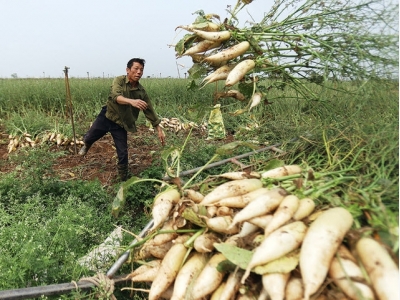Vietnamese farmers should study market demand to avoid oversupply, losses: PM

A farmer throws away his haul of radishes. Photo by VnExpress
'Before you sow the seeds, you need to know who you’re selling the crop to and how much you’re selling it for.'
Vietnam’s prime minister has said that farmers should focus more on producing goods that have a market demand while working with investors and entrepreneurs on more efficient production plans.
PM Nguyen Xuan Phuc was speaking with farmers at a conference in the northern province of Hai Duong on Monday, where he listened to cases of oversupply causing them huge losses.
Local farmer Tang Van Truong said recent cases of radishes, kohlrabies and sugarcane being disposed of due to oversupply are a “sad thing” for Vietnamese agriculture. Sharing his sentiment, Dang Thi Diu, a farmer from Quang Ninh Province in northeastern Vietnam, said farmers feel “stuck” because the same problem occurs year after year, while accessing market information remains difficult.
PM Phuc said cases of oversupply are generally localized issues and did not reflect Vietnam’s agriculture sector as a whole. He said the government is calling for more investment in agricultural development to help alleviate the problem.
Phuc also said farmers should try to be more in tune with market demands and produce accordingly, while cooperating with investors, entrepreneurs and communes to better coordinate production plans and prevent future cases of oversupply.
“There needs to be cooperation between farmers, the government, scientists, entrepreneurs, banks and distributors to plan out crop production. Before you sow the seeds, you need to know who you’re selling the crop to and how much you’re selling it for,” said the PM.
Cases of oversupply are a perennial problem in Vietnam. Crops such as watermelons, onions, sugarcane and shallots are fed to livestock or just thrown away instead of being sold due to oversupply that causes massive price drops. Some farmers even say the money they make from selling these products just isn’t worth the effort of selling them in the first place.
According to economists, Vietnam’s oversupply phenomenon is a result of spontaneous production by farmers facilitated by a lack of production plans from the government and virtually no connection or communication between farmers and entities such as investors or entrepreneurs.
Related news
Tools

Phối trộn thức ăn chăn nuôi

Pha dung dịch thủy canh

Định mức cho tôm ăn

Phối trộn phân bón NPK

Xác định tỷ lệ tôm sống

Chuyển đổi đơn vị phân bón

Xác định công suất sục khí

Chuyển đổi đơn vị tôm

Tính diện tích nhà kính

Tính thể tích ao



 Bac Giang encourages mushroom growing linkage chain
Bac Giang encourages mushroom growing linkage chain  Smart tech increases farmers’ income
Smart tech increases farmers’ income